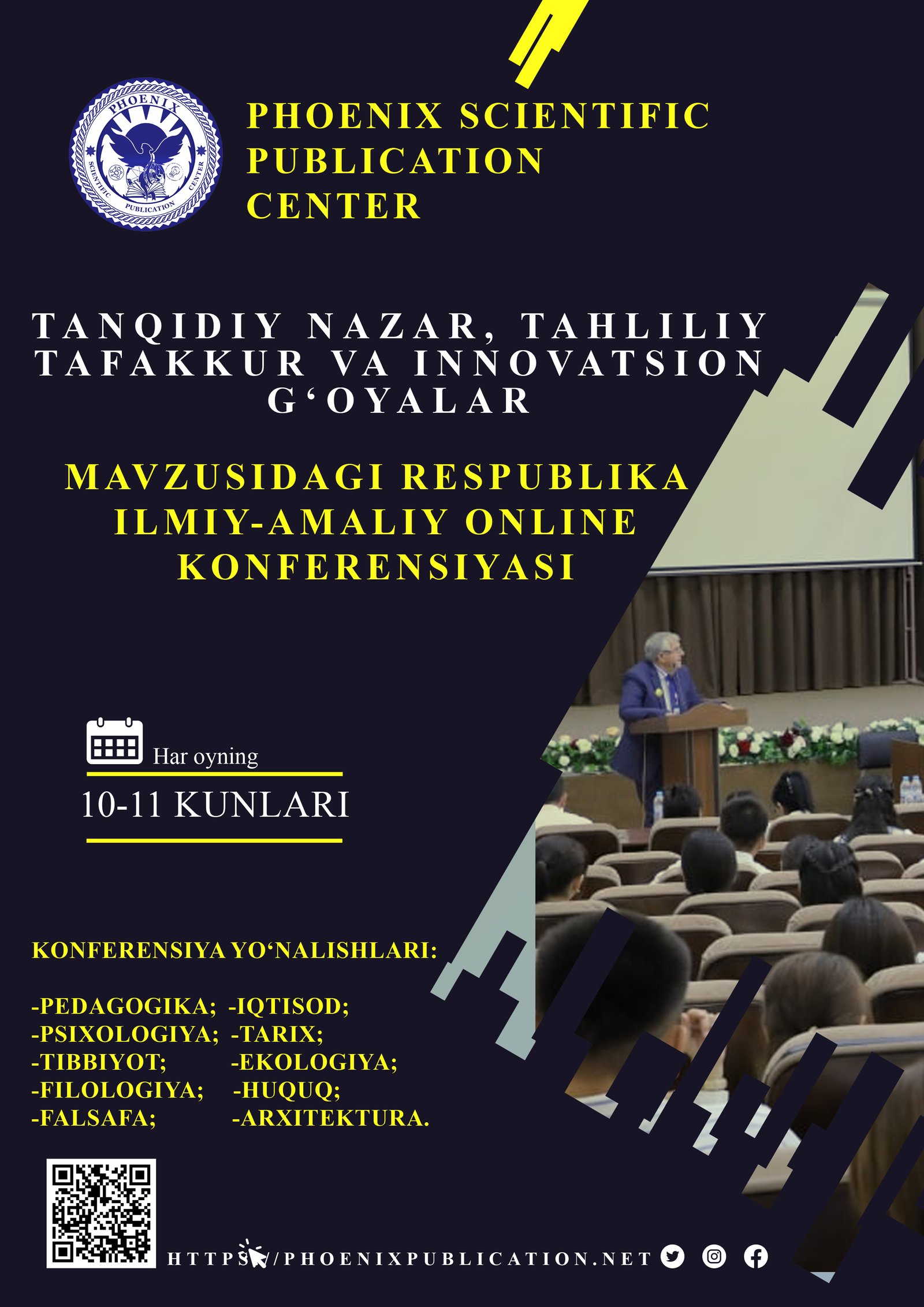Abstract
This article examines the integration of assessment criteria for functional literacy with reflective approaches in the context of chemistry education. As educational priorities shift toward competency-based learning, it is essential to establish clear indicators for evaluating students’ ability to apply chemical knowledge in real-life contexts. The paper outlines key components of functional literacy in chemistry, such as problem-solving, scientific reasoning, contextual understanding, and decision-making based on chemical evidence. In parallel, it explores reflective pedagogy as a means to foster self-awareness, critical thinking, and metacognitive regulation. The study highlights assessment tools and strategies—including performance-based tasks, learning journals, and formative feedback—that align with both functional learning outcomes and reflective skill development. By combining measurable criteria with student-centered reflective practices, chemistry educators can more effectively support and evaluate meaningful learning processes. The findings underscore the importance of aligning assessment with real-world application and learner introspection to cultivate scientifically literate and reflective individuals.
References
;1. Bybee, R. W. (2013). The Case for STEM Education: Challenges and Opportunities. Arlington, VA: NSTA Press.
2. Xoliyorova S., Tilyabov M., Pardayev U. Explaining the basic concepts of chemistry to 7th grade students in general schools based on steam //Modern Science and Research. – 2024. – Т. 3. – №. 2. – С. 362-365.
3. Xayrullo o'g P. U. B., Rajabboyovna K. X. Incorporating Real-World Applications into Chemistry Curriculum: Enhancing Relevance and Student Engagement //FAN VA TA'LIM INTEGRATSIYASI (INTEGRATION OF SCIENCE AND EDUCATION). – 2024. – Т. 1. – №. 3. – С. 44-49.
4. Bransford, J. D., Brown, A. L., & Cocking, R. R. (2000). How People Learn: Brain, Mind, Experience, and School. Washington, DC: National Academy Press.
5. Xayrullo o'g P. U. B., Umurzokovich T. M. Inquiry-Based Learning in Chemistry Education: Exploring its Effectiveness and Implementation Strategies //FAN VA TA'LIM INTEGRATSIYASI (INTEGRATION OF SCIENCE AND EDUCATION). – 2024. – Т. 1. – №. 3. – С. 74-79.
6. Pardayev U. et al. THE EFFECTS OF ORGANIZING CHEMISTRY LESSONS BASED ON THE FINNISH EDUCATIONAL SYSTEM IN GENERAL SCHOOLS OF UZBEKISTAN //Journal of universal science research. – 2024. – Т. 2. – №. 4. – С. 70-74.
7. Choriqulova D. et al. The role of the method of teaching chemistry to students using the" assessment" method //Modern Science and Research. – 2024. – Т. 3. – №. 11. – С. 256-264.
8. Narzullayev M. et al. THE METHOD OF ORGANIZING CHEMISTRY LESSONS USING THE CASE STUDY METHOD //Modern Science and Research. – 2024. – Т. 3. – №. 5. – С. 119-123.
9. Amangeldievna J. A., Xayrullo o'g P. U., Shermatovich B. J. Integrated teaching of inorganic chemistry with modern information technologies in higher education institutions //FAN VA TA'LIM INTEGRATSIYASI (INTEGRATION OF SCIENCE AND EDUCATION). – 2024. – Т. 1. – №. 3. – С. 92-98.
10. Amangeldievna J. A. et al. THE ROLE OF MODERN INFORMATION TECHNOLOGIES IN CHEMICAL EDUCATION //International journal of scientific researchers (IJSR) INDEXING. – 2024. – Т. 5. – №. 1. – С. 711-716.
11. Van Driel, J. H., Beijaard, D., & Verloop, N. (2014). Professional development and reform in science education: The role of teachers' practical knowledge. Journal of Research in Science Teaching, 38(2), 137–158.
12. Abdukarimova M. A. Q. et al. Tabiiy fanlar o ‘qitishda STEAM yondashuvi //Science and Education. – 2024. – Т. 5. – №. 11. – С. 237-244.
13. Xayrullo o'g P. U. et al. The importance of improving chemistry education based on the STEAM approach //fan va ta'lim integratsiyasi (integration of science and education). – 2024. – Т. 1. – №. 3. – С. 56-62.
14. O‘G‘Li U. B. X. et al. The effectiveness of using modern information and communication technologies (ICT) in chemistry education //Science and Education. – 2025. – Т. 6. – №. 2. – С. 350-363.
15. Tilyabov M., Pardayev U. KIMYO DARSLARIDA O ‘QUVCHILARNI LOYIHAVIY FAOLIYATGA JALB QILISH USULLARI //Modern Science and Research. – 2025. – Т. 4. – №. 5. – С. 42-44.
16. Pardayev U., Abdullayeva B., Abduraximova M. ZAMONAVIY VIRTUAL LABORATORIYA PLATFORMALARIDAN FOYDALANIB KIMYO FANINI O ‘QITISH SAMARADORLIGINI OSHIRISH //Modern Science and Research. – 2025. – Т. 4. – №. 5. – С. 48-50.
17. Xayrullo o‘g, P. U. B. (2025, June). CHEMICAL ANALYSIS-BASED ASSESSMENT OF THE HERBICIDAL EFFICIENCY OF AZIDO-SUBSTITUTED TRIAZINES. In CONFERENCE OF ADVANCE SCIENCE & EMERGING TECHNOLOGIES (Vol. 1, No. 2, pp. 53-62).
18. Xayrullo o‘g, P. U. B. (2025). INVESTIGATION OF THE REPELLENT ACTIVITY AGAINST IXODID TICKS BASED ON THE STRUCTURAL AND PHYSICOCHEMICAL PROPERTIES OF DIBUTYL ADIPATE. TANQIDIY NAZAR, TAHLILIY TAFAKKUR VA INNOVATSION G ‘OYALAR, 2(1), 265-273.
19. Shernazarov I. et al. Methodology of using international assessment programs in developing the scientific literacy of future teachers //Spast Abstracts. – 2023. – Т. 2. – №. 02.
20. Тилябов М. НАУЧНОЕ ЗНАЧЕНИЕ ПОДГОТОВКИ СТУДЕНТОВ К МЕЖДУНАРОДНОМУ ОЦЕНОЧНОМУ ИССЛЕДОВАНИЮ //Предпринимательства и педагогика. – 2024. – Т. 5. – №. 2. – С. 108-120.
21. Tilyabov M. Functional literacy competencies and methods for their development in future teachers //Решение социальных проблем в управлении и экономике. – 2025. – Т. 4. – №. 2. – С. 5-8.
22. Vygotsky, L. S. (1978). Mind in Society: The Development of Higher Psychological Processes. Cambridge, MA: Harvard University Press.
